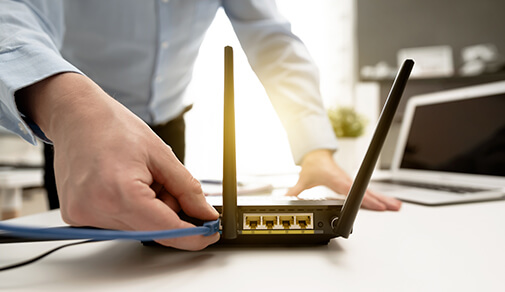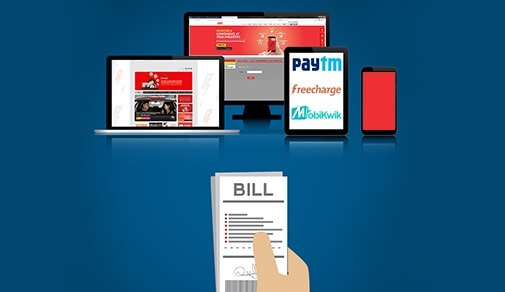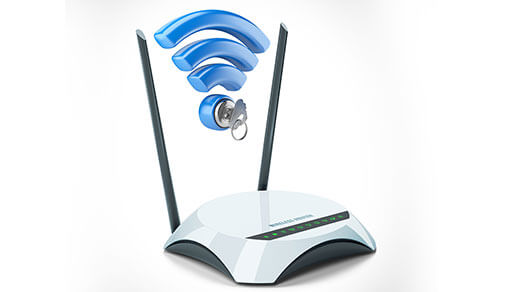How to Get the Best Internet Connection for Day Trading?
Monday, Dec 12, 2022 · 25 mins
1982

Introduction
Trading has undergone a paradigm shift in recent decades, thanks to the digital revolution! The ongoing innovations in digital technologies have ushered in a new era with lightning-fast broadband connections and real-time interactions.
Professional day traders earn by assessing financial markets and trading at the best possible rates. Even milliseconds can draw the line between success and failure.
One needs robust and stable broadband for day trading to avoid things getting awry. In this hyper-connected digital world, the connection speed definitely defines the rate of success. A fast and reliable broadband connection from a trusted partner ensures seamless trading and higher chances of achieving success.
What is day trading?
Day trading refers to buying and selling shares of stocks, bonds, and other commodities to earn profits from their price movements. Day traders typically enter and exit trades multiple times daily to make profits and avoid risks by closing all transactions by the end of the day.
With the inception of the internet, day trading became a lucrative career option for many, especially those who like to work from home. However, it was only recently, during the COVID-19 pandemic, that online trading experienced a surge. It has a lot to do with the fact that traders can now conveniently do online trading from their homes with the help of numerous online platforms and interfaces that make trading easier.
The fast proliferation of mobile phones also led to a slew of mobile apps for trading. With over6.64 billion smartphone usersworldwide, mobile has become the most sought-after platform for day trading and accessing the stock market on the go. Everything is at the fingertips of professional traders, from stock trading to share market updates. However, all this is not possible without a broadband connection.
Whether trading is done from a mobile device or computer, a high-speed broadband connection is essential for reliable trading. To be able to sell or buy stocks quickly, shortcuts on the computer or laptop often come in handy.
For those traders who trade on their phones, relying solely on mobile data can lead to a slow internet connection or laggy interface, especially if they are in a locality with poor network coverage. The best option would be to use a Wi-Fi connection for their mobiles powered by a fast broadband connection.
Prerequisites for choosing the proper broadband for day trading
For a professional day trader, it is crucial to look for these three main things while choosing the proper broadband connection:
Fast:
A slow internet connection and trading do not go well. Traders need a fast broadband connection that works without any lags. It ought to be fast enough to support the seamless loading of web pages.
Think of it as carrying precious cargo on the road, and a high-speed broadband connection controls a lane on the highway; therefore, the faster the broadband connection, the lesser the number of detours and stops.
In day trading, as soon as the price of an asset changes, thousands of packets of data make a round-trip from one device to another. This is measured as ping time. Ping time is different for movement to different locations.
A trader needs a stable broadband connection of at least 1 Mbps for day trading. This ensures that the broadband for day trading supports continuous data streaming without any latency. If the user experiences a lag, they will not be able to check the stock prices in real-time. The ideal broadband for day trading should have decent upload and download speeds to run the trading software seamlessly.
Reliable:
A reliable broadband connection implies that the traders can trust the connection for stability. No trader wants to lose their profits by fiddling around or facing connection issues.
If a trader loses their connection (which they might in some cases), they need to have a backup. A viable alternative is to set up a mobile hotspot for such emergencies. It is not ideal, but it can work. However, one can avoid this inconvenience if they have a reliable broadband connection in the first place.
Secure:
Day traders often deal with a major challenge: securing their data and transactions. Online hacking and phishing scams target traders, especially those who do high-volume trading. It has become increasingly important for traders to secure their connections to safeguard their data and transactions.
The best way to ensure security is to avoid using public Wi-Fi hotspots. The last thing they want is these hotspots sniffing their details and sensitive data. Traders should always connect all their devices through a safe and secure internet link.
Helpful tips for choosing the best broadband for day trading
Once traders have set up the basics like a powerful computer and trading software to support their day trading, it is time to get started by investing in an equally powerful broadband connection as well. Here are some tips to help choose the best broadband for day trading:
Reputed internet service provider:
Traders must choose an internet service provider (ISP) with good customer reviews. Day traders cannot compromise on speed or reliability; they also need a secure connection.
One must remember that there is no need to reinvent the wheel. Hence, traders can start searching for a broadband connection by finding out which ISP their peers, especially the successful ones, are using in the same city or locality.
Then it is important to check the reviews of the ISP and know its plans, data limits, speed and uptime record. Also, it is important to find out how good the shortlisted ISP’s customer service is, especially during glitches, as traders cannot wait indefinitely for their connection failures to resolve.
Value for money:
For professional day traders, choosing the best broadband plan is essential to running their business. Selecting any internet plan at face value is not wise for those who pursue trading full-time. Selecting the right broadband for day trading can be more complex than it seems.
Cheap broadband plans often compromise on speed as well as data limits, which create hurdles on the way to seamless trading. Therefore, traders should ensure they do not merely opt for the cheapest option while selecting broadband for day trading. The connection should provide value for money to the traders.
The type of broadband
Different broadband alternatives exist in the market for various requirements. Wire and wireless broadband follow different approaches. In the case of a wired broadband connection, the internet is provided through fibre or ADSL.
The ADSL uses standard copper phone lines to provide internet and is pretty reasonable. However, the downside is that the connection has a lot of latency.
Contrary to that, optical fibre is the latest technology available in two variants – fibre to the premises (FTTP) and fibre to the cabinet (FTTC).
Fibre broadband is considered the best option for day trading, given its high speed and dependability. It is more reliable than copper lines connection and helps improve ping rates.
Day traders should invest in a wired connection rather than a wireless one. Since wireless broadband often uses airways and may occasionally experience latency due to different factors.
Data usage limits:
Many ISPs provide attractive broadband plans that appeal to customers for their affordability, but they often have limitations. The most common one is the restriction on data downloads. It is less than ideal for day traders even though such connections come at an affordable price.
Day trading websites and software require excellent download speed to seamlessly function and transfer a lot of data. If day trading is a full-time profession, then a day trader must invest in a broadband plan that offers unlimited or desired download speed without restricting the bandwidth. If not, they may experience a relatively slow connection and a higher ping rate, which is unsuitable for trading.
Multiple vs single service:
Many ISPs provide services like a single line to connect multiple devices. This is useful in some cases and can also save traders extra bucks, but not always. If a trader has devices like smart speakers, mobile phones, smart TVs, tablets, and computers connected through a single internet connection, their internet connection may occasionally suffer.
In situations where all the gadgets are used simultaneously, the internet connection will suffer, and latency will be imminent. Therefore, investing in separate and dedicated broadband for day trading is advised. Traders should avoid having multiple devices on a single connection.
Excellent customer service:
It is inevitable to experience downtime or occasional technical issues with an internet connection. This is beyond anyone’s control, but a trader can decide on choosing the ISP with the most reliable customer support in their area.
Before choosing an ISP, they should consult their peers and check online reviews of ISPs. They must also know that the location also influences the strength of their broadband connection. Therefore, traders should look for an ISP with good reviews and extensive customer support.
They can also ask for a demo to understand the ISP’s reliability and support services. All in all, traders should hunt for a reliable ISP that offers timely assistance.
Contention rate:
Contention rate or contention ratio refers to the number of individuals connected via the same network or data capacity at a given time. As a rule of thumb, a lower contention rate dictates higher internet speed.
This is a crucial point to consider regarding day trading as traders cannot allow their internet speed to suffer. Sharing the internet connection with other users can pose a significant hurdle during trading. If more users are connected, the internet connection will weaken; therefore, traders should look for an internet connection that serves a limited set of users in a region.
Testing the internet speed beforehand:
Day traders need a solid internet connection to optimise their bandwidth during day trading. Alike gaming, the ping rate also matters in day trading. Generally speaking, the ping rate should be as low as possible to support trading activities.
A ping rate lower than 10 to 15 ms should be ideal for day trading. Therefore, testing the broadband connection speed before subscribing is important. Traders can visit websites likespeedtest.netandfast.com to check the broadband speed. Day traders can test the internet speed that helps them make an informed decision on whether to continue with the said broadband plan or not.
The traders must pay attention to the router to make the most of their trading experience. A router prioritises the traffic in a way that the internet signal strength remains optimal.
Upload and download speeds:
Apart from an actively running broadband connection, traders also need to pay attention to the upload as well as download speeds.
Upload speed refers to the rate at which information is sent from their device to others. Download speed refers to the rate at which data is received in their devices.
That being said, traders need decent upload and download speeds for day trading. Ideally, the minimum upload speed should be a minimum of 1 Mbps and a download speed of up to 2 Mbps.
This will ensure that day traders do not face any major latency issues while deciding where to buy and sell the shares. They must remember that other factors also play a role in determining their broadband connection speed at any given time.
Conclusion
Choosing the best broadband connection for day trading can be challenging, with multiple options and points to consider. The above tips will help professional traders secure a reliable, fast, and cost-effective broadband connection that fulfils their requirements. The most straightforward way to approach this is by getting high-speed broadband for day trading that offers decent speed without any latency and security issues.
Be Part Of Our Network
All Categories
- BUSINESS INTERNET
- Router
- Internet Security
- Wi-Fi Connection
- Wi-Fi Network
- Internet Broadband
- smartfiber
- Internet Speed
- TV Streaming
- Wifi Connection
- BEST BROADBAND PLANS
- BROADBAND PLANS | 5GHz
- 2.4GHz
- 5GHz frequency
- 5GHz WiFi frequency
- 2.4GHz frequency
- LDRs
- LONG DISTANCE RELATIONSHIP
- ACT Fibernet
- wifi as a service
RECENT ARTICLES

Find the perfect internet plan for you!

















